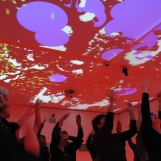Full Name: Dr Christina Papagiannouli
Venue and Date: University of South Wales, Cardiff Campus, The ATRiuM, 6 April 2019
What were the main points that emerged from your interim event this year?
ZU-UK joint directors Dr Jorge Lopes Ramos and Persis Jade Maravala talked about the company’s work on audience experience and engagement, proposing a model of post-immersive audience participation through interdisciplinary collaboration. The keynote included a demonstration of the VR live performance Goodnight, Sleep Tight, performed by Welsh performer Victoria Matthews. Although ZU-UK are not interested in technology per se, they see themselves as hackers, hacking existing technologies to re-purpose them, as well as hacking their own artistic work, and public spaces and commercial buildings (i.e. Queen Elizabeth Olympic park and Westfield shopping centre, East London), whist resisting ‘immersion’. Dr Joseph Dunne-Howrie, research associate at ZU-UK, responded to the keynote with a paper titled Towards a Post-Immersive Manifesto. Jorge, Jade and Joseph are proposing a post-immersive audience participation model, critiquing the neo-liberal rise of immersive theatre, where all of this is happening ‘around’ the participants, not ‘with’ the participants, and their presence is often inconsequential.
All delegates experienced the one-to-one
Goodnight, Sleep Tight live VR performance. Described by delegates as a ‘fairly emotional’ experience, the performance was a 360VR video of a mother figure (Persis Jade Maravala) performing a bed-time routine at the same time as the actress performed in real-time the same bed-time routine to the participants. Dressed in pyjamas and lying on a bed, participants see themselves as having the body of a child via the VR set, while they feel the touch of the virtual mother through the physical touch of the performer. This is a great example of what Dixon calls ‘virtual touch’ (2006, p. 70), a moment of real contact and intimacy between physical and virtual bodies and physical and virtual spaces. Soon the participants as children ‘fall asleep’ and enter into a dream situation where they fly like Peter Pan hearing the voice of a child talking about childhood, adultness and death, before the mother figure wakes them up. The first part of the VR experience is usually recorded at the space where the performance takes place, blurring even more the boundaries between the real and fictional experience.
Responding to the interim call for papers, Eleni Kolliopoulou (Ulster University), Dr Stuliani Keramida (University of Reading) and Kerry Wise (De Montfort University) focused on Empathy, Inclusiveness and Embodiment in immersive technologies performance practices, which is the proposed theme for the Performance and New Technologies WG meeting at the 2019 TaPRA conference (University of Exeter). Dr Harry Robert Wilson (Digital Thinker in Resident, National Theatre of Scotland), Prof. Sophy Smith (De Montfort University) and Dr Piotr Woycicki (Aberystwyth University) looked at immersive storytelling and dramaturgy, focusing on immersive technologies as a narrative medium. As mentioned on our interim event proposal, interim events are vital for this working group, in that they allow an extended space for practice sharing, and discussion centred on practice. Indeed, most of the paper presentations focused on practice research. Eleni Kolliopoulou talked about the creation process of video installation
Sky-field (1&2). Kerryn Wises’ paper focused on her current performance
Exposure, a mixed reality, one-to-one experience using 360 video and live performance and she presented some of the initial investigations and experiments under the working title of
DIS/PLACE. Prof. Sophy Smith presented on transdisciplinary collaboration to develop an immersive story and storyworld for 360 dance performance. She discussed emerging transdisciplinary processes in immersive practice that developed through the practice-based approach the team took to devise the immersive story, reminding us that in transdisciplinary research same words might mean different things for different disciplines and different words might mean the same thing. Dr Piotr Woycicki demonstrated the AR version of Our Lady of Shadows, a practice-as-research project in collaboration with Lucy Gough, Karoline Grintzner and Priotr which explores the aesthetics of neo-medievalism through an intermedial dramaturgy and digital scenography.
The event finished with a drink reception and the launch of Performance and VR Practice special issue, IJPADM. Prof. Sophy Smith guided us through the special issue and presented a summary of the articles and talked about the experience of completing this work. Co-conveners announced that a call for papers will be circulated for a forthcoming Performance and New Technologies affiliated issue with the IJPADM for publication on 2020.
Types of contributions (papers, performances, workshops, etc.)
Paper presentations, practical-demo, a special issue launch and a VR live one-to-one performance
Number of Delegates: 17 (including 3 invited speakers)
How many were new to TaPRA? 10
Did you have any non-UK participants? No
Any additional points or feedback not covered above?
We used the following Twitter hashtag: #perfnewtech
Please see here for further details and pictures: https://mmd.research.southwales.ac.uk/news-and-events/events/immersive-and-interactive-technologies-and-live-performance-vrarmr-practices/
Overall budget awarded: £599
Amount spent: £599
Breakdown of costs:
£250 for invited keynote. ZU-UK invoiced USW £500 (including VAT). To be paid half/half between TaPRA and MMD.
£59 for drink reception.
£50 to support travel for PhD student Kerryn Wise.
£50 to support travel for PhD student Eleni Kolliopoulou.
Up to £190 to support travel and accommodation for invited speaker Prof. Sophy Smith, tbc.

